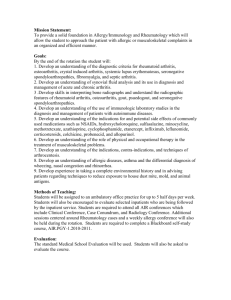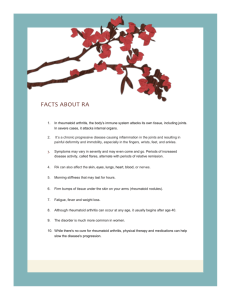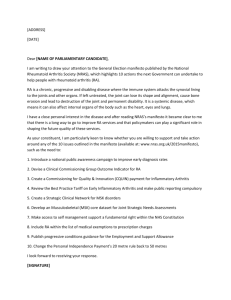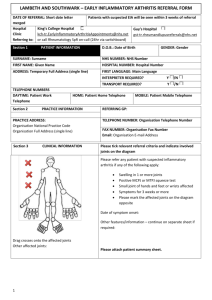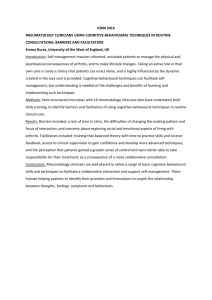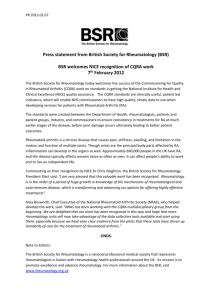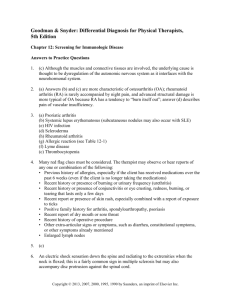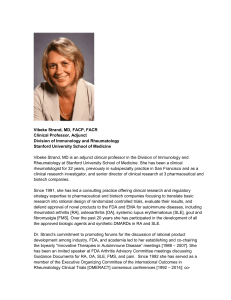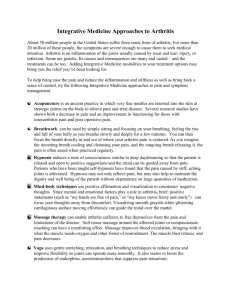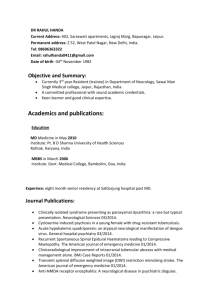Self-Help Guide for Rheumatology Patients Oxford University Hospitals
advertisement
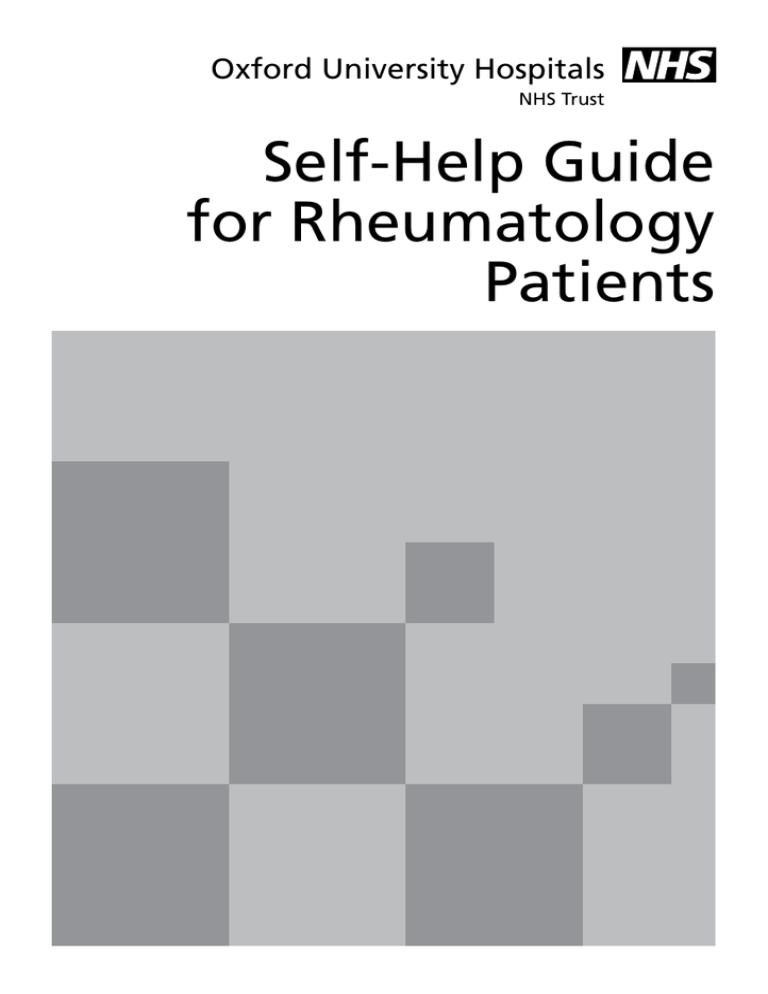
Oxford University Hospitals NHS Trust Self-Help Guide for Rheumatology Patients What is a ‘flare’? Inflammatory arthritis is unpredictable. The symptoms can become worse or ‘flare’ at any time. These ‘flares’ are an increase in symptoms such as pain, swelling, joint stiffness (especially in the morning), feeling generally unwell and fatigue that can last hours or weeks. What are the possible causes of a flare? Mostly these are unknown; however, it is known that increased stress can cause your joints to flare, as can vaccinations and infections. What can I do to manage a flare? Before contacting the advice line, please try a few of the self-help treatments below: Medication: Regularly taking non-steroidal anti-inflammatory tablets (NSAIDs) such as ibuprofen and/or painkillers such as paracetamol may help to control your pain. Only take these if you know you are not sensitive or allergic to the ingredients. Never exceed the recommended dose. Treatment for joints: Heat: hot water bottle, heat pad, wheat bag, bath/shower. Cold: bag of ice cubes or frozen peas, wheat bag or jelly pack. These treatments can be applied to the affected joint for up to 15 minutes at a time, as required. Always place a damp towel between your skin and the heat/cold source to prevent burning, skin irritation or damage. Anti-inflammatory gels may be applied to swollen or inflamed joints. These should be used cautiously, especially if you are also regularly taking anti-inflammatory tablets. page 2 What about rest and exercise? During a flare it is important to pace your activities. It is not harmful to continue to exercise your joints even if they are flared, but you may wish to adapt your usual exercise regime. Once the flare has passed you can restart your more active exercise. You may find relaxation techniques also help to reduce the pain. What if I am still having symptoms? If the flare continues for more than 5 to 7 days and hasn’t responded to the self-help treatments, please contact us on the advice line for further help. Tel: 01865 737 656 When you call we might ask you: •How long have you had the symptoms and where? Is it pain/swelling/stiffness? • Have you tried any self-help treatments? • Have you had a recent blood test? •Do you currently have an infection/cough/cold/chest infection or urine infection? Do you feel unwell in any way other than your joints flaring? •Which medications are you taking; have you started on any new medication recently? • Have you had previous problems in these joints? • Have you had any joint injections that have helped? •Have previous depomedrone injections been helpful and when was your last one given? page 3 The advice line is also there for clinical advice relating to your condition, such as: •if you are experiencing side effects that may be caused by the medication you are prescribed for your arthritis •if you experience a reaction to an injection given in the clinic •if you have been asked by a member of the rheumatology team to report your progress •if you have had significant contact with chicken pox or measles. How does the service work? The telephone advice line service is a message service. The rheumatology practitioners will listen to your message and answer your enquiry as soon as possible. They will call you back within two working days (Monday to Friday). Please speak slowly and clearly. You will be asked for: • your full name, date of birth and NHS Number • contact telephone numbers • a brief outline of the problem or question. It is important that if your problem requires urgent attention you should contact your GP or go to the nearest accident and emergency department. For routine changes or cancellations of appointments: Tel: 01865 737 333 or 01865 738 039 page 4 Education sessions for people with a diagnosis of inflammatory arthritis (self-management) When and where do these sessions take place? The first Tuesday of every month in the Lecture Theatre at the Nuffield Orthopaedic Centre, between 9.45am and 12.15pm. Sessions are also held at the Horton Hospital every 3-4 months. Please ask your practitioner for the dates of these sessions. What is the aim of the education session? • To learn about the condition you have been diagnosed with. • To understand the treatments which you may be prescribed. •To learn more about what you can do yourself to improve the condition. •To know how the different team members can help you now and in the future. • To be able to meet other people with inflammatory arthritis. How can I book onto the education session? Your specialist will refer you when you have a new diagnosis of inflammatory arthritis or you can book a place at a session by calling the advice line. There is further information about these sessions (as well as a copy of the presentation shown at the sessions) on our webpage: www.ouh.nhs.uk/rheumatology/information/patients/default. aspx page 5 National Rheumatoid Arthritis Society (NRAS) Patient Group This is an informal group, run by patients for patients, supported by the NOC (Nuffield Orthopaedic Centre) rheumatology team staff. What are the aims of this group? •To provide support, education and information about Rheumatoid arthritis (RA) in a social environment. • To encourage self-management of RA. • To support the work of NRAS and of the NOC. When and where do these sessions take place? The second Tuesday of January, March, May, July, September and November. The meetings take place in the Lecture Theatre at the Nuffield Orthopaedic Centre from 6.30pm to 8.00pm. There are also sessions due to be launched in Banbury. For information on future programmes contact: National Rheumatoid Arthritis Society Tel: 0800 298 7650 Website: www.nras.org.uk You can also call the rheumatology telephone advice line for information: Tel: 01865 737656 page 6 Useful websites for additional information: Arthritis Research UK Tel: 0300 790 0400 www.arthritisresearchuk.org National Rheumatoid Arthritis Society Tel: 0800 298 7650 www.nras.org.uk Arthritis Care Tel: 0808 800 4050 www.arthritiscare.org.uk page 7 If you have a specific requirement, need an interpreter, a document in Easy Read, another language, large print, Braille or audio version, please call 01865 221 473 or email PALSJR@ouh.nhs.uk Jane Flynn, Advanced Practitioner, Rheumatology Rheumatology Practitioner Team June 2014 Review: June 2017 Oxford University Hospitals NHS Trust Oxford OX3 9DU www.ouh.nhs.uk/patient-guide/leaflets/library.aspx OMI 10577P
